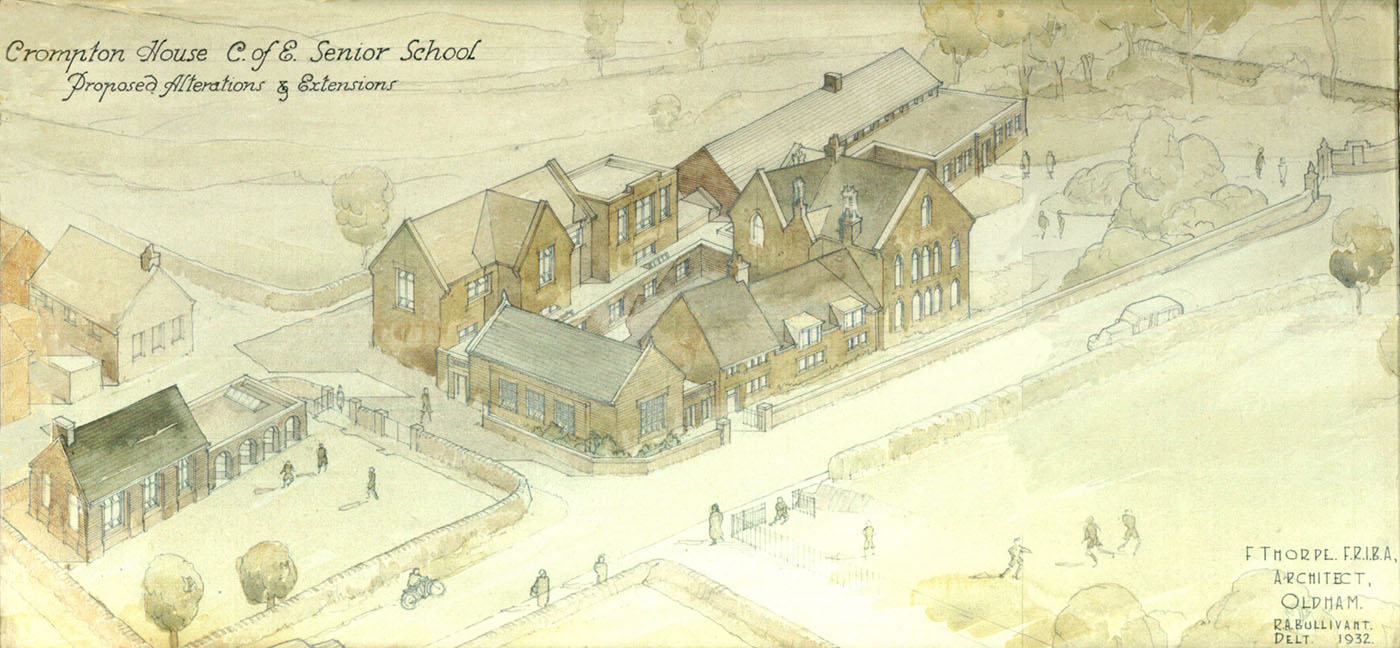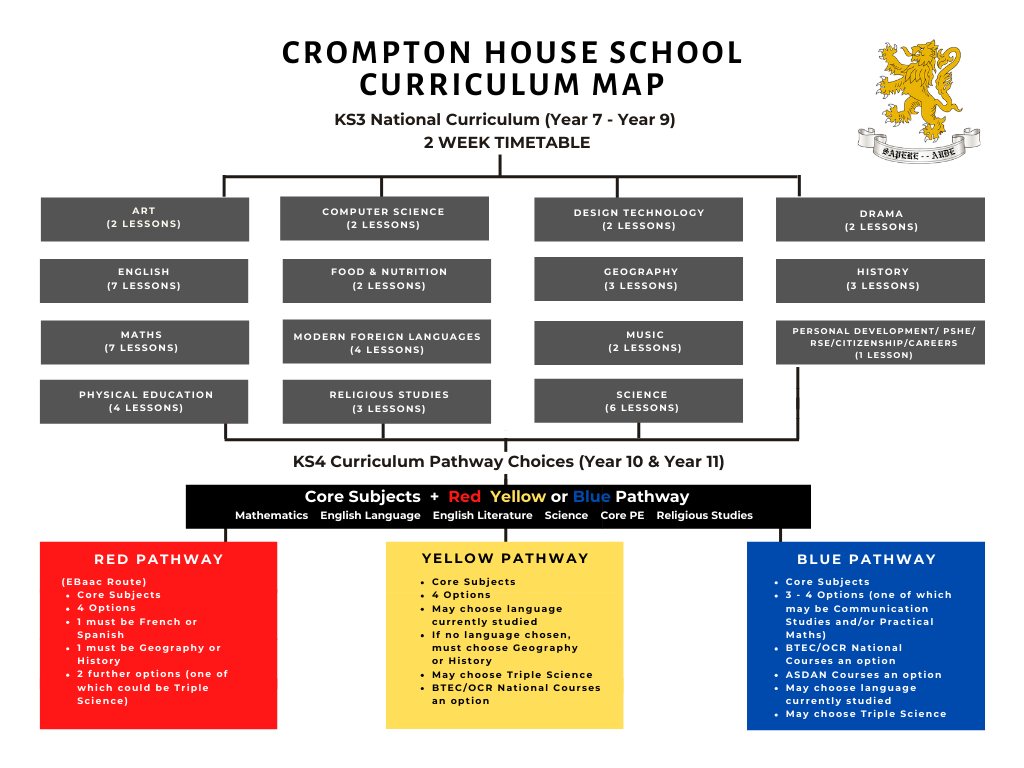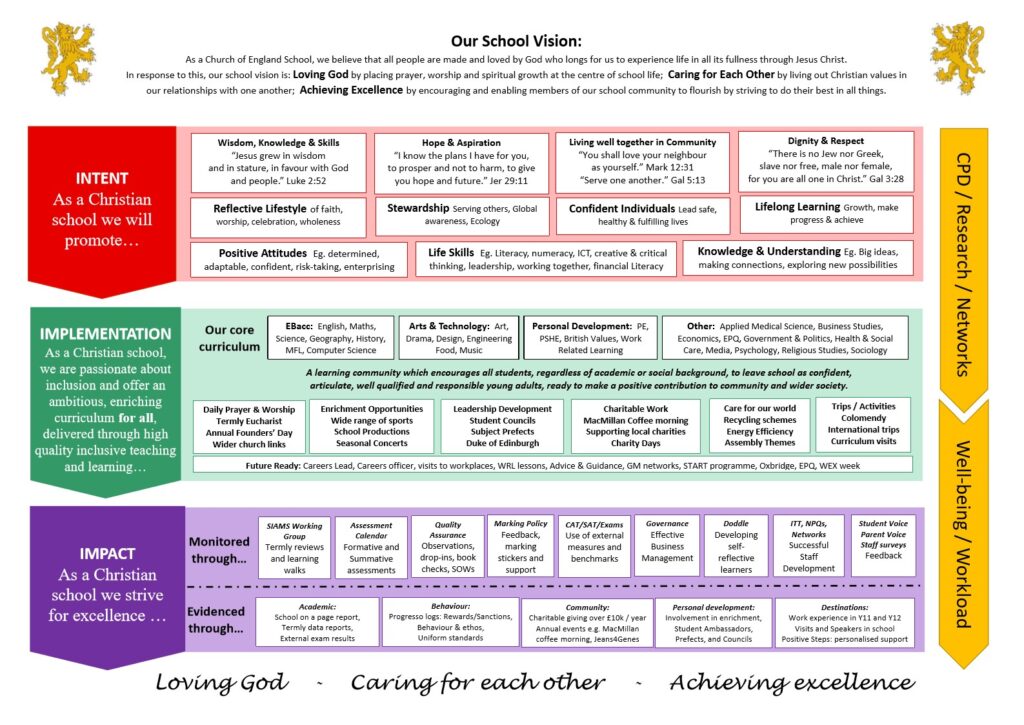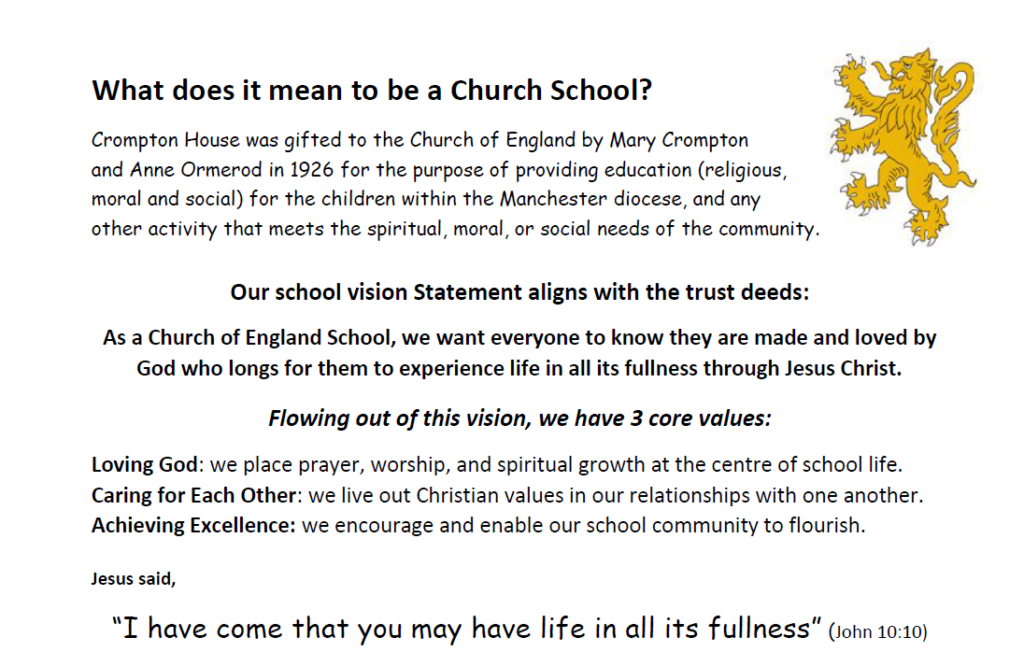History and Christian Ethos
Loving God | Caring for each other | Achieving Excellence
Crompton House was established as a Church school in 1926 with a strong Christian ethos to serve young people and families within the local community. Recognising our historic foundation, the school will preserve and develop its religious character in accordance with the principles of the Church of England and in partnership with the Churches at parish and diocesan level. Our school and everything we do is summarised by our three core values:
- Loving God
- Caring for each other
- Achieving Excellence
We aim to serve the local community by providing education of the highest quality within the context of Christian belief and practice. We encourage an understanding of the meaning and significance of faith, and promote Christian values through the experience we offer to all pupils.
Our Core Beliefs
We believe humans are made in the image of God, for an enriching lasting relationship with God and each other. Each person should be treated as a uniquely valuable individual.”
In response to this:
- We value and welcome all regardless of gender, age, ethnic origin, creed or sexual orientation and believe that all forms of bullying and discrimination are unacceptable
- We support each member of our school community to discover their own identity, gifts and talents and to grow in self-worth and the realisation of their value and role within society.
- We will seek the welfare of each other as exemplified in the lifestyle and self-sacrifice of Jesus.
Mutual respect is a minimum standard expected of all; however, we aspire to excellence in all our relationships and not merely to equality or mutual tolerance - We will look for ways to help and support others in the wider local, national and international community.
We believe that there are external absolute standards of right and wrong, and that individuals have responsibility for making good choices in life, and accepting the consequences of their own actions and decisions.”
In response to this:
- We recognise our shared responsibility when things go wrong and the importance to work together in an environment of trust, respect and openness.
- We will value the experiences and opinions of all and seek to learn from one another, and seek as far as possible, to balance the needs of the individual against the needs of the community.
- We will reward those who make good choices and celebrate the positive benefits that result from their actions. We will correct those who make bad choices and help them to develop more positive attitudes and actions.
- We believe that the central message of the Christian faith is the power of forgiveness, hope and transforming grace, that is achieved through the work of Christ and the Holy Spirit.
We believe that true education must encourage the mental, physical and spiritual development of each pupil. Whilst the Christian faith is the majority faith with historical roots in Britain, we also acknowledge that we are a multi-faith society and honour those of others faith traditions and welcome the contribution that they bring to our schools.
In response to this:
- We make provision in each school day for acts of reflection and worship that are Christian in nature, but also make explicit the values and beliefs that we share with other faith traditions. At the end of each term the whole school celebrates Holy Eucharist presided over by ministers from local Anglican Churches.
- We seek to deliver a broad, balanced and enriched curriculum, so that students are excited by and immersed in their learning, fostering the development of attitudes and skills that will help them to learn about the world in which we live and give students increasing control over their own lives and help them to make informed choices.
- We seek to provide a caring and happy environment where every child feels safe, secure and part of our school family and develop a mutually supportive partnership between home, school and the wider community.
- We will actively support and promote British values of democracy, the rule of law, individual liberty, and mutual respect and tolerance of those with different faiths and belief.
Our History
Founded in 1926, Crompton House Church of England School opened its doors to the first 25 pupils on 1st October 1926. The original school buildings, which now mainly house the administrative offices of the school, were once the former home of the Crompton Family, given as a gift by Mrs Anne Ormerod and Miss Mary Crompton to the Church Commissioners for the establishment of a Higher Grade Church School following the government’s decision to establish separate schools for students aged 11 and above.
Situated in a pleasant residential area in the Pennine foothills near the border between the Metropolitan Boroughs of Oldham and Rochdale, with stunning views over the Pennine hills Crompton House School is a Church of England 11-18 co-educational comprehensive school with academy status.
We have approximately 1370 pupils including a Sixth Form. We do not have a sponsor but have maintained our strong relationship with the Church of England Diocese of Manchester.
In recent years the school has grown considerably in numbers from 706 in 1985 to its present position and every year there is considerable over-subscription for the places available. The school has a large catchment area attracting pupils from outside the Oldham Metropolitan Borough from Rochdale, Middleton, Alkrington, Bamford, Littleborough and Saddleworth.
The image below shows the Architect’s plans for extending the newly donated building, first extension of many to come.

The Cromptons
Miss Catherine Cocker of Newbank Heyside (daughter of Catherine Crompton) died leaving the Crompton Estate to her sister Mrs Anne Ormerod and her cousin Miss Mary Crompton. They offered the house and £100 per year trust fund to pay for the up-keep of the school. The trust fund is maintained to this day by the School Trustees.
School Crest
Our School emblem and logo originate from the lions found on the Crompton Family Coat of Arms. The coat of Arms can still be seen in the entrance way to the main house. The logo is worn by all with pride and is detailed on the blazer pockets of all students.
Welcome to the School
Visitors to the School will note the pineapples that adorn the gate posts as a sign that all are welcome inside. This tradition dates back hundreds of years to the Caribbean Islands where travellers knew there would be a welcome in a village if they saw pineapples at the entrance.
Speech Day
The school’s first speech day was held in the Pavillion Cinema in Rochdale in 1960. A tradition continued today with an annual speech night now held within the much extended school building to commemorate and celebrate the success of the sixth form students who return to the school to collect their certificates.
Our School Community
Young people are our future and Governors and staff at Crompton House School believe it is vital for us to prepare them for the challenges and opportunities that lie ahead by giving everyone the flexibility to respond to the ever-changing society in which we live.
Visitors to our school will find a blend of tradition, coupled with the latest technological advances, in an atmosphere of calm and purposeful learning. We are a lively, energetic community that seeks to offer a host of opportunities for all.
It is recognised, understood and welcomed that teachers will come to Crompton House with a variety of faiths, beliefs and backgrounds; however, teachers are required to agree, as part of their contract, to uphold and promote the Christian ethos of the school.
The Head and other members of the senior leadership team take a direct role in the positive promotion, design and delivery of acts of collective worship. We recognise and celebrate important secular and religious festivals and welcome visitors into assemblies and lessons from the local community and other faith traditions. Students are given opportunity to voluntarily meet each week to explore the Christian faith and provision is also made to enable students of other faith traditions to express their spirituality within the life of the school.
Religious Studies is taught to all students (11-16) within the core curriculum, and it is expected that all students will be entered for the GCSE course in Religious Studies. The school also promotes wider opportunities for personal, social, health, citizenship and careers education.
The school actively develops links with neighbouring schools, businesses, churches and other faith traditions. Pupils are also encouraged to support local charities and community projects with their time, talent and contributions.
Our School Vision
As a Church of England School, we believe that all people are made and loved by God who longs for us to experience life in all its fullness through Jesus Christ. In response to this, our vision is this: Loving God, by placing prayer, worship, and spiritual growth at the centre of of school life; Caring for Each Other by living out Christian values in our relationships with one another; Achieving Excellence by encouraging and enabling members of our school community to flourish by striving to do their best in all things.
Click to read our full school vision.
A Caring Sharing Community
Crompton House is a “Family”, and like all families, you will see a family ethos that runs through everything we say and do. So what does it look like?
- Shared values based on the Christian belief that life is a gift from God, and that each person is valued and special.
- Mutual respect and acceptance and zero-tolerance for any form of discrimination or bullying.
- Faith expressed through action and actively seeking for ways to serve each other and our local community.
- The importance of forgiveness and the opportunity to learn from our mistakes and strive for excellence.
- A desire to nurture the whole-person: physically, emotionally, mentally and spiritually.
Our SIAS report stated, “Pupils receive an outstanding Christian based education at the school. High expectations and explicit Christian beliefs and values are at the heart of all it does.”
We are immensely proud of our students and the way they conduct themselves around school and represent the school in the community. Students are actively encouraged to develop their confidence and leadership skills, to be actively involved in the life of the school, e.g. in music, drama, sports and many other events, trips and activities that take place throughout the year.
Each year, our students raise between £10-15,000 for many different charities and good causes. Students are creative in the way they achieve this, including sponsored events, leg waxing, cake sales and non-uniform days to name but a few.
We also love to welcome visitors to our school. On open evenings and parents nights our students are keen to greet visitors with a smile, show visitors around the school, answer questions and provide refreshments.
Helping our students to achieve a high standard of education and gain outstanding qualifications is very important to us, this enables our students to pursue their dreams and become a full and active member of society.
Accommodating other Faith Traditions
We have a steadily growing intake of students from other non-Christian faith traditions, especially at Sixth Form. This is highly welcomed and we value the richness and diversity they bring to the school. We are delighted at how well all students quickly settle into school life, build meaningful relationships and contribute back into school life. It is our strong desire that all students are able to express their beliefs and celebrate their cultural and religious distinctiveness within the life of the school.
To this end we are building links to community faith leaders from all religious traditions, and also working with our students to look for new and exciting ways to help provide a rich and diverse expression of faith within the school. Whilst the predominant expression of faith will be Christian in nature, it is imperative that our students are prepared for living and working in a multicultural society. We believe the best way to achieve this is to actively celebrate the truths and values we all share, and to respect and warmly embrace the distinctiveness of each tradition without fear or rejection.
Religious Studies
“The religious education (RE) department achieves outstanding academic results and has a very positive influence on pupils’ learning, development and behaviour.” (SIAS report)
All students (Years 7-11) receive between 3 to 4 hours of religious studies every two-weeks.
In Years 7-8 students are introduced to the importance of faith and belief in everyday life. Students learn about other world faiths including Judaism, Sikhism and Islam. They also learn about the life of Jesus and an extended study on Christian faith in Action.
In Year 9 pupils are prepared for the GCSE topics to be taught in Years 10-11. They explore philosophical questions such as evidence for the existence of God, the problem of evil and suffering, the Holocaust, and also discuss human rights and modern moral dilemmas.
At GCSE all students complete the AQA Religious Studies specification Unit B. Through studying RS students gain the opportunity for reflection, discussion, questioning, and problem solving. Each year our students achieve exceptional results in their RS examination.
“Pupils state that RE helps them to reflect on their attitudes and behaviour, consider social and moral issues and see connections with worship, PSHE and the school’s Christian character.” (SIAS report)
Collective Worship
Collective worship is central to the life of the school and valued by all for its contribution to the ethos and learning. Each week there are numerous opportunities for collective worship including form time activities, whole-school assemblies and end of term communions.
Our assemblies are both engaging and thought-provoking. Using weekly themes we explore a wide range of topics and issues, and these often link to related activities that take place in form time. We encourage students to be actively involved in our assemblies, and each week different form groups will plan and deliver an assembly to other students in their house group.
Communion services on the last day of each term provide a valuable opportunity for prayer, reflection and coming together as a family of faith. Communions are presided over by members of the local clergy, but also provide opportunity for students to share with each other by leading prayers, sharing readings or through music and singing.
British Values at Crompton House School
As British Values are a very important part of education. The Department for Education states that there is a need:
“To create and enforce a clear and rigorous expectation on all schools to promote the fundamental British values of democracy, the rule of law, individual liberty and mutual respect and tolerance of those with different faiths and beliefs”.
Crompton House CoE Academy is committed to serving its community. Within our ethos of Loving God, Caring for Each Other and Achieving Excellence, we have always embodied British values. We recognise the multi-cultural, multi-faith and ever-changing nature of the United Kingdom and as a school of Christian heritage we look to promote ‘life in all its fullness (John 10:10). We also understand the vital role we have in ensuring that groups or individuals within the school are not subjected to intimidation or radicalisation by those wishing to pressurise, or illegally influence them.
Our school reflects British values in all that we do. We aim to nurture our children on their journey through life so they can grow into safe, caring, democratic, responsible and tolerant adults who make a positive difference to British society and to the world. We encourage our children to be creative, unique, open-minded, and independent individuals, respectful of themselves and of others in our school, our local community and the wider world.
We agree with and uphold Department for Education’s five British Values:
- Democracy
- The rule of law.
- Individual liberty.
- Mutual respect.
- Tolerance of those of different faiths and beliefs.
The examples below summarise the ways in which we seek to embed British Values:
Democracy: The principle of democracy is consistently being reinforced at Crompton House, with democratic processes being used for important decisions within the school community, for instance, elections being held for the Sixth form student council. We run parallel mock elections and always take part in Oldham Youth Council elections, promotion of political events and the importance of registering to vote for our sixth formers.
The principle of democracy is also explored in “SUPER LEARNING DAYS” as well as in Assemblies.
PSHE, units play an active part in educating students about DEMOCRACY and some students have the opportunity to access visits to the Houses of Parliament. Elements of citizenship are delivered as part of the PSHE programme.
In addition, Student Voice is very strong at Crompton House and we feel that, by valuing and responding to the students, we demonstrate their democracy and freedom.
We have Student Councils i.e. The Sixth Form – from which students’ feedback on what was discussed, suggested and resolved, is then reported to the Senior Leadership Team (SLT). Students are equally involved in the interviewing process when new appointments are made in school. They also play a massive role in supporting charities, not only choosing the activities that they do to raise money, but also making decisions regarding where the money that has been raised goes. Over the past few years, students from Crompton House have supported those involved in the Haiti and Nepal earthquakes, annually support Comic Relief / Sport Relief, Education for All in Morocco and supported local charities such as the ….
In 2022-23, Crompton House will focus on a range of local and national charities.
The Rule of Law: The importance of laws, whether they may be those that govern the class, the school, or the country, are consistently reinforced at Crompton House. Students are taught the rules and expectations of the school, sign a Home School Agreement stating that they and their parent/carers understand and agree to follow rules and our rules are consistently reinforced through our assemblies and curriculum.
Students are taught about the consequences of abiding or not abiding by rules within school through our behaviour system – showing clear positive and negative consequences. Students are also taught and reminded about UK law through Religious Studies, PHSE and in a range of different topics, including equality, personal safety and e-safety. Throughout the year, we welcome a range of visitors from the Health Service, the Police, Theatre in Education and a range of speakers from local and national charities who reinforce this message.
The rule of law is explored through PSHE lessons in which students learn about law making and administration. It is also emphasised that all people are equal before the law.
Individual Liberty: At Crompton House, students are actively encouraged to make independent choices, with the knowledge that they are in a safe, secure, and supportive environment. Staff work hard to provide a positive culture using our Caring for each Other key value – educating students and providing them with boundaries enabling them to make informed choices, through a safe and empowering education. Students are ALL encouraged to set personal targets and seek to challenge themselves in individual classes, giving them more freedom to determine their own success. We offer a wide range of enrichment activities, which students have the right to choose from, based on their interests.
Students are also encouraged to know, understand and exercise their rights and personal freedoms and are advised on how to exercise these safely – for example, through e-safety. Crompton House has a robust anti-bullying culture and has in place a comprehensive Behaviour Policy.
Students are encouraged to understand and exercise their rights and personal freedoms and advised to exercise these safely, through assemblies, PSHE, Super Learning Days and other subjects. This can also include their freedom of choice when participating in extra-curricular activities.
We aim for students to become independent, believing this can boost and nurture a healthy self-esteem.
The Universal Declaration of Human Rights, The Human Rights Act and how these link to personal responsibilities are all taught through the PSHE curriculum.
Mutual Respect: Respect is an underpinning value at Crompton House and is at the core of our school life. Students learn that their behaviours have an effect on their own rights and those of others. All members of the school community treat each other with respect and this is reiterated through our teaching and learning environments. Mutual respect is embraced throughout the curriculum by providing the opportunity for students to express their views in a safe environment. (Diversity Group/s, Student Voice, buddying systems) PSHE curriculum.
Tolerance of those of different Faiths and Beliefs: This is achieved through equipping students with the ability to understand their place in a culturally diverse society and by giving them opportunities to experience such diversity through a culturally rich and diverse curriculum. Crompton House promotes EQUALITY within its ethos of Loving God and Caring for Each Other and students are regularly reminded of school and UK policy as well as being given an array of opportunities to self–express i.e. the Diversity Group. We invite in a range of outside speakers and seek to draw from our multi-faith staff, to deliver assemblies and activities which promote tolerance and understanding. We engage in annual celebrations of European Language Week, Black History month and Pride month.
Students are widely taught about anti-discrimination laws as well as understanding diversity in the UK through their PSHE lessons.




